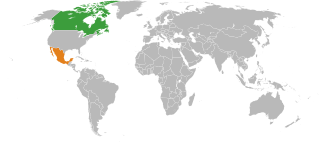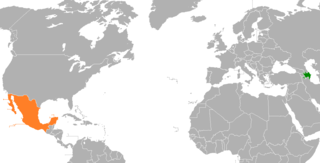 | |
Armenia | Canada |
|---|---|
Diplomatic relations exist between Armenia and Canada. Both nations are members of the Organisation internationale de la Francophonie and the United Nations.
 | |
Armenia | Canada |
|---|---|
Diplomatic relations exist between Armenia and Canada. Both nations are members of the Organisation internationale de la Francophonie and the United Nations.
Canada recognized Armenia soon after its separation from the Soviet Union in 1991. In 1992, Armenia and Canada formally established diplomatic relations. [1]
Over the years, both nations have signed bilateral agreements, such as a Trade and Commerce Agreement (1999); Promotion and Protection of Investments Agreement (1999) and an Agreement on the Avoidance of Double Taxation and the Prevention of Fiscal Evasion with Respect to Taxes on Income and on Capital (1999). [2]
In 2006 Canada officially recognized the Armenian genocide. [2] In October 2018, Canadian Prime Minister Justin Trudeau paid a visit to Armenia to attend the 17th Summit of the Organisation internationale de la Francophonie. During the visit, Prime Minister Trudeau met with Armenian President Armen Sarkissian and Prime Minister Nikol Pashinyan; to further strengthen the relations between both nations. [3]
In October 2023, Canada opened its first resident embassy in Yerevan. [4]
In 2020, total trade between both nations totaled US$25.2 million. [5] Armenia's main exports include: precious metals and stones and textile products. Canada's main exports include: food products, machinery and equipment, and chemical products. [5]
| Embassy of Canada in Yerevan | |
|---|---|
| Location | Yerevan |
| Address | 10 Vazgen Sargsyan St, Yerevan 0010 |
| Ambassador | Andrew Turner |
| Embassy of Armenia in Ottawa | |
|---|---|
 Embassy of Armenia in Ottawa | |
| Location | Ottawa |
| Address | 7 Delaware Ave ON K2P 0Z2 |
| Ambassador | Anahit Harutyunyan |

Relations between Armenia and France have existed since the French and the Armenians established contact in the Armenian Kingdom of Cilicia in the 12th century. Formal diplomatic relations between Armenia and France were established on 24 February 1992. Due to the good relations between the two countries, 2006 was proclaimed the Year of Armenia in France.

The nations of Canada and Mexico established formal diplomatic relations in 1944. Initially, ties between the two nations were dormant, but since the 1990s relations between Canada and Mexico have positively developed as both countries brokered NAFTA.

Bilateral relations between the Argentine Republic and Canada have existed for over a century. Both nations are members of the Cairns Group, G20, Organization of American States and the United Nations.

The Armenian community in Argentina is the largest in Latin America totaling approximately 150,000 members.

Ties between Canada and Lebanon date back to the Ottoman Empire; however, formal bilateral relations were first established in 1954. Canada is home to one of the largest Lebanese diaspora communities. Both nations are members of the Organisation internationale de la Francophonie and the United Nations.

Foreign relations exist between Armenia and Uruguay. Uruguay, as a small South American nations hosts a large Armenian community for its size. The Armenian community in Uruguay totals approximately 16,000 people.

Canada and Italy. Both nations enjoy friendly relations and are close allies and partners through their membership in the G7, G20, NATO and the Organisation for Economic Co-operation and Development. Relations also centre on the history of Italian migration to Canada; approximately 1.5 million Canadians claim to have Italian ancestry.

Canada and Turkey have maintained diplomatic relations since 1943. Both countries are members of the G20, NATO, Organization for Economic Co-operation and Development, Organization for Security and Co-operation in Europe, United Nations and the World Trade Organization.

Canada and Singapore have maintained diplomatic relations since 1965. Both nations are members of the Asia-Pacific Economic Cooperation, Commonwealth of Nations and the United Nations.

Zohrab Hrachiki Mnatsakanyan is an Armenian diplomat. Mnatsakanyan previously served as Minister of Foreign Affairs and Armenia's Permanent Representative to the United Nations.

Canada and Portugal have friendly bilateral relations, the importance of which center on the history of Portuguese migration to Canada. Canadians of full or partial Portuguese ancestry number approximately 482,000 people. Both nations are members of NATO, the OECD, and the United Nations.

The nations of Azerbaijan and Mexico established diplomatic relations in 1992. Both nations are members of the United Nations.

The nations of Armenia and Mexico established diplomatic relations in 1992. Both nations are members of the United Nations and the World Trade Organization.

Canada and Vietnam have maintained bilateral relations since 1973. Both nations are members of the Asia-Pacific Economic Cooperation, Organisation internationale de la Francophonie and the United Nations.

Canada and Madagascar established diplomatic relations in 1965. In addition to their bilateral relations, both countries are full members of the Francophonie, United Nations and the World Trade Organization.

Diplomatic relations between Canada and Senegal began in 1962. Both nations are members of the Organisation internationale de la Francophonie.

Relations between Armenia and Brazil, have existed for decades. The Armenian community in Brazil is the second largest in Latin America totaling approximately 100,000 members. Armenia has an embassy in Brasília and Brazil has an embassy in Yerevan.

Armenia–Spain relations are the bilateral relations between Armenia and Spain. The importance of relations centers on the history of Armenians migration to Spain. Approximately 40,000 Armenians and their descendants reside in Spain. Both nations are members of the Council of Europe and the OSCE.

Canada and Ivory Coast established diplomatic relations in 1962. In addition to their bilateral relations, both nations are members of the Organisation internationale de la Francophonie.

Diplomatic relations exist between Armenia and Chile. There are over 600 Armenians and descendants residing in Chile today. Both nations are members of the United Nations.